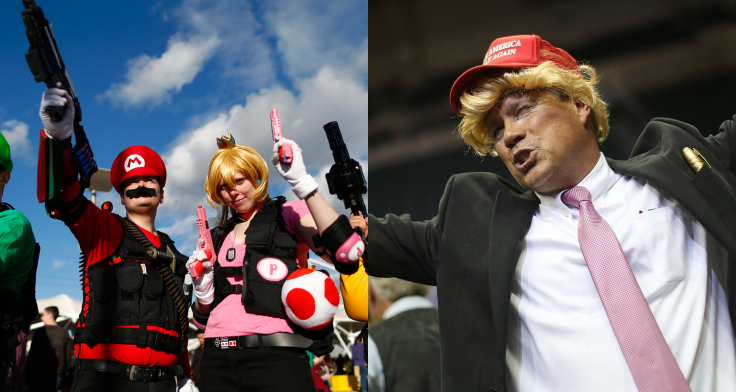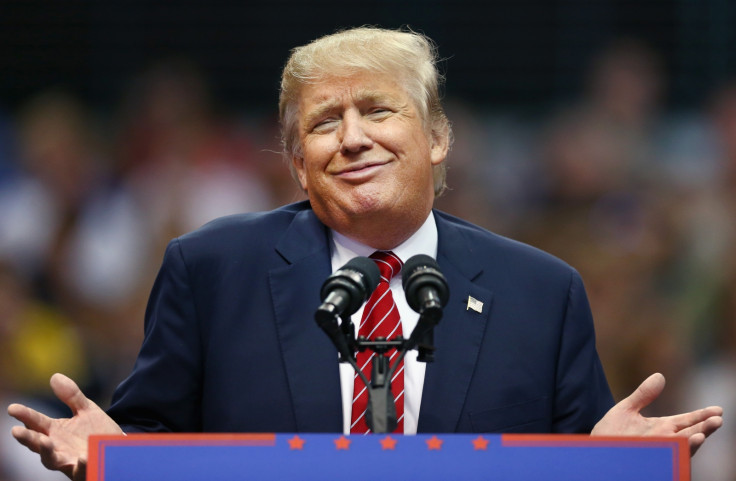Geek culture and video game fandom aren't so different from Donald Trump's cult of personality
A look at fan culture and how it's impacted the 2016 US presidential election.

It's 4 November and across America people are holding up signs. If they are tired, unwise and easily led, that sign might say 'Vote Trump'. If they're frightened, astute and determined to do the right thing, it might say 'Vote Clinton'.
In California, however, outside the Anaheim Convention Centre, is a man holding a third sign: "Want to buy 2 passes!" He has been here for more than an hour and so far none of the 25,000 people attending Blizzcon – an annual celebration of video-game producer Blizzard Entertainment, and its various gaming products – have obliged him.
Blizzcon offers something special. In the midst of the most unnerving election in recent history, it brings two days of escapist respite. But it is exclusive, also. To enjoy the show unabated, you must be a true disciple.
People flaunt the merchandise, buy the products, dress as their favourite characters. They may not be single-minded fans, but fandom is often a reliable presence in their lives, and as unsure, anxious human beings, like us all, such consistency is irresistible.
So long as you keep paying, the company will be here. And in exchange for money, belief in its practises and your help spreading its influence, it provides a sense of identity, simple truths and a fantastical other world into which you can escape and repair. Fandom might embody its most nakedly privatised form, but such a transaction has been repeated, in the church, for centuries. The lone and ignored churchgoer stood outside Blizzcon holding a fourth sign, reading 'Jesus Died for your Sins', cannot compete with the religious fervour of pop-culture fandom.
But it's a scam. Blizzard and companies like it will give you what you want, be it a new game or something more abstract, like a sense of belonging, but only for as long as you are paying. The owners of such dedicated fandoms give a hug so they may reach discreetly into your pocket. If you recognise this but enjoy their embrace nonetheless, then at least you know what you are purchasing. More power to you. If however, you sincerely believe that a corporation cares at all once you stop giving it your money, you deserve to be taken for your every single penny.
Even more insidious than corporations' money-making with a smile is when fandom, for its practitioners, mutates into a passive aggressive protest against the outside world. 'Geek culture', by its fantastical and infantile nature, implies that adult society – real-life – is less interesting than made up stories. By all means reject literature, the news and social interaction with any persons unlike yourself, but don't be surprised when they reject you in kind. Just as fandom decides that mainstream culture isn't worthy of attention, mainstream culture doesn't owe fandom understanding or acceptance.
As I stood outside Blizzcon, watching this hardcore fan cadge for Blizzcon tickets, I thought of Donald Trump.

Only a cursory look into Trump's past will tell you he has nothing in common with working Americans. His rhetoric isn't so much laced with narcissism as drunk on it, and yet blue-collar voters from across the country not only support Trump but do so despite overwhelming proof that he can't lead and doesn't care or know about them.
To anyone watching Trump's rallies from the outside, it's blindingly, deafeningly obvious that he's a huckster and a con-man, working people into a simple froth so that he may take from them attention, adoration and votes. To those on the show floor, Trump is a truth teller. With fantastical tales about imprisoning rivals, draining the swamp and building walls, he provides refuge from the mainstream, often disappointing, political day-to-day.
Trump is seductive. He takes the marginalised (or at least, people who believe they have been marginalised) and promises affirmation for both them and their odious daydreams. Facts are irrelevant. Nuance is irrelevant. What matters, both to Trump and his misled, lied-to supporters, is image. Trump's fans want to be seen as outsiders, and so play into and out of his marketing. Trump himself is a consummate of the pickpocket cuddle. So long as his demagoguery and half-policies get him into the White House, it'll be too late when people realise they've been robbed.
Trump has created and plundered his own fandom. Like video game, television, movie and comic book companies, the quality of what he is selling is irrelevant – what matters to people is that they're buying and that through doing so, they earn a position within a congratulatory, massaging, exclusive social club. From espousing national identity, to supporting a football team or talking about what you eat, the desire to belong to something – or to phrase it more abstractly, to feel as if you have connected to something, somewhere – prevails human psychology. Blizzcon gets it. Trump gets it. But if a punter got it, they would unlikely want to belong to any fandom. Surely nobody would volunteer themselves to be shanghaied.
When I returned to my hotel room, put on CNN and saw that Donald Trump, by several estimates, is poised to become president, I wanted to forget – to forget the big, bad outside world, and all the confusion. Fandom is a safer. It is a more welcoming. You have to pay to get in and too much time inside will warp your perspective, but in one form or another all people, from all places, across all time have sought sanctuary from life's chaos, so why fight it?
It's 4 November and across America people are holding up signs. It's just some weigh less than others.
For all the latest video game news follow us on Twitter @IBTGamesUK.
© Copyright IBTimes 2025. All rights reserved.






















